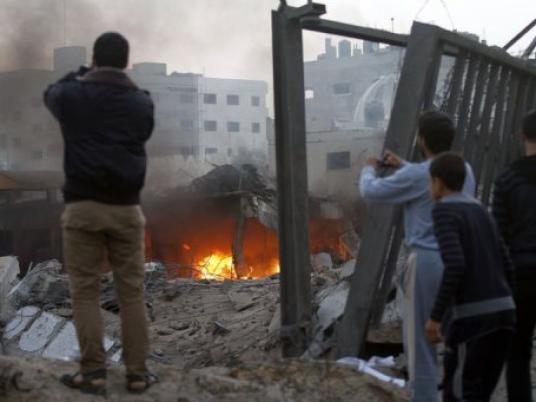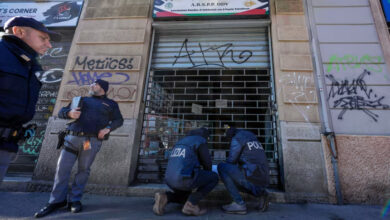
A bomb exploded on a bus in central Tel Aviv on Wednesday, wounding at least 10 people in what officials said was a terrorist attack that could complicate efforts to secure a ceasefire in the Gaza Strip.
The blast shattered windows on the bus, which was driving along a tree-lined street next to Israel's huge defense ministry complex. Israel's ambulance service said three of the wounded were in a severe condition.
"This was a terrorist attack," said Ofir Gendelman, a spokesman for Prime Minister Benjamin Netanyahu.
In a message on Twitter, he said police were combing the area for the person who planted the device, confirming reports that it was not a suicide attack. Israeli media said a man had been arrested.
The bombing happened on the eighth day of an Israeli offensive against the Hamas-ruled Gaza Strip and celebratory gunfire rang out across the Palestinian enclave when local radio stations reported news of the explosion.
Hamas spokesman Sami Abu Zuhri praised the bombing, but stopped short of claiming responsibility.
"Hamas blesses the attack in Tel Aviv and sees it as a natural response to the Israeli massacres … in Gaza," he told Reuters. "Palestinian factions will resort to all means in order to protect our Palestinian civilians in the absence of a world effort to stop the Israeli aggression."
Sweet cakes were handed out in celebration in Gaza's main hospital, which has been inundated with wounded from the round-the-clock Israeli bombing and shelling.
The last time a bomb blast hit Israel's commercial capital was in April 2006, when a Palestinian suicide bomber killed 11 people at a sandwich stand near the old central bus station.
Hamas militants have fired at least four rockets at the laid-back Mediterranean metropolis over the past week, but none of them have scored direct hits or caused any casualties.
Ambulances converged on the bus on Wednesday, with television showing smoke rising from the broken windows. The vehicle was not torn apart in the explosion, suggesting it might have been a relatively small bomb.
"We have no indications it was a suicide bomber. But it was an attack," Tel Aviv police chief Yoram Ohayon told Channel 2 television.
The attack happened as US Secretary of State Hillary Clinton was in Israel trying to calm tensions over Gaza. She was due to fly to Cairo later in the day for talks with President Mohamed Morsy, who is spearheading ceasefire negotiations.
Clinton had earlier expressed "rock solid" support for Israel's security while calling for a de-escalation of the conflict in Gaza where fighting on Wednesday entered its eighth day, despite signs of an emerging truce.
The top US diplomat flew in for talks with Netanyahu as efforts continued across the region to refine an elusive accord to end a week of violence that has cost 136 Palestinian and five Israeli lives.
In a late-night meeting in Jerusalem, Clinton told Netanyahu that Washington's commitment to Israeli security was "rock solid and unwavering."
But she also stressed that this "is why we believe it is essential to de-escalate the situation" in the Palestinian territory.
And she indicated that a truce announcement may not emerge until after she completes visits to the West Bank capital of Ramallah and Cairo for talks with Morsy.
"In these days ahead, the United States will work with our partners here in Israel and across the region for an outcome that bolsters security for the peace of Israel, improves conditions for the people of Gaza and moves toward a comprehensive peace for all people of the region," said Clinton.
Militant sources in Gaza had initially said a deal could be announced in Cairo on Tuesday night following days of Egyptian-brokered negotiations between Israel and Hamas.
But Hamas officials said the indirect negotiations were ongoing, as an Egyptian official told AFP in Cairo that "the truce announcement is not expected tonight because we are still waiting for a response" from the Jewish state.
An Israeli diplomatic source told AFP that negotiations were ongoing.
As they held late night talks in Jerusalem, Netanyahu told Clinton he was ready to agree to a "long-term solution" as long as the rocket attacks from Gaza stopped.
A senior Hamas official told AFP in Cairo that a key sticking point was the timing of when Israel would begin easing its six-year blockade of Gaza.




